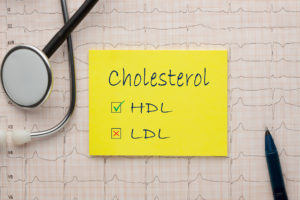 It is widely known that cholesterol levels are associated with the risk of heart attack, but new research has found an exciting timeline that could indicate this risk. It was found that having elevated cholesterol during the teens or early twenties increases a person’s risk of having a heart attack, stroke, or another cardiovascular event during middle age.
It is widely known that cholesterol levels are associated with the risk of heart attack, but new research has found an exciting timeline that could indicate this risk. It was found that having elevated cholesterol during the teens or early twenties increases a person’s risk of having a heart attack, stroke, or another cardiovascular event during middle age.
The study, led by researchers from the University of Maryland School of Medicine (UMSOM), found that the risk of cardiovascular events persists even in those who are able to get cholesterol levels down to a healthy range before reaching their late 30s. This means that young adults must take cholesterol levels seriously by following healthy lifestyle choices from a young age.
Advertisement
The American College of Cardiology’s cholesterol management guidelines recommends using lifestyle choices to help lower high low-density lipoprotein (LDL) levels during the teenage years. These choices can include exercise, maintaining a healthy body mass index, and following a healthy diet low in saturated animal fats.
Cumulative LDL Cholesterol
The study used complex mathematical modeling to understand how cardiovascular risk could rise with increasing cumulative LDL cholesterol over an average of 22 years. They found that the more time of exposure to LDL cholesterol, the more likely participants were to experience a major cardiovascular event.
“Interestingly and importantly, we also found it was not just the area under the curve that accounted for the difference in risk but also the time course of the exposure,” said study co-author Charles Hong, MD, Ph.D. “This underscores the importance of regular cholesterol screenings beginning in early adulthood to help reduce this time of high exposure.”
This research makes a strong case for doctors to intervene early to treat high levels of LDL cholesterol. This “bad” cholesterol is known to be a cause of the worldwide epidemic of heart disease and stroke. The guidelines currently recommend that doctors consider prescribing cholesterol-lowering medications to prevent heart disease in those aged 20 to 39 who have elevated cholesterol levels.
Medications such as statins are most commonly prescribed, especially in those who have a family history of early-onset heart disease. The problem with drugs such as statins is the harmful side effects, mainly if prescribed at such a young age. This is why there is such a push behind healthy lifestyle choices, which could potentially help many avoid having to take prescription medications.
“Cardiovascular disease remains the biggest killer in the world, and this new finding provides a potential way to save many lives,” said E. Albert Reece, Executive Vice President for Medical Affairs, UM Baltimore. “The medical community should sit up, take notice, and respond to this important new evidence.”
